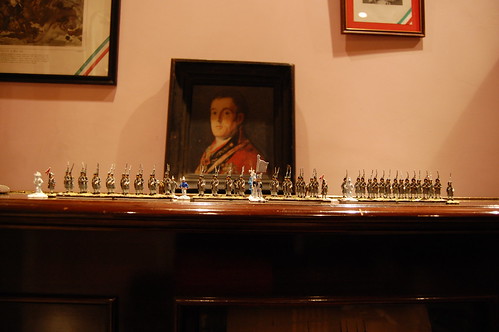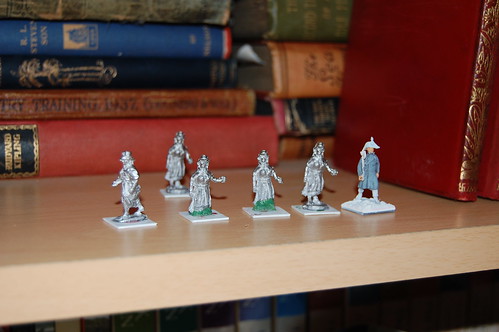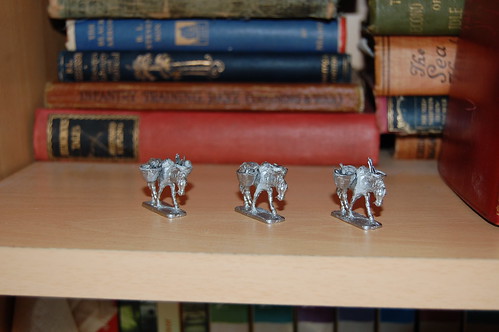 Huntzmanberg, a castle on the border between
Huntzmanberg, a castle on the border betweenRuritania and the Hapsburg domains.
Note the Swartzkrag mountains in the blackground.
Aquatint by Mikail Patrickson 1836.
Ruritanian Government
Ruritania was once described by Count Metternich, during the Council of Vienna in 1815, as "…a model of good government, the pinnacle of enlightened absolutism and an ornament to the world". Though briefly a republic after French invasion, the idea was so unpopular that the populace revolted in support of their King with "God and King Michael and Death to the French!" as their rallying cry. Imposed from without, the short lived Republic of Hentzau stood little chance and soured the Ruritanians on the idea for a generation. Many radicals have bitterly regretted their collaboration with the French, arguing that "…eighteen months of French bayonets accomplished what hundreds of years of despotic misrule could not; a popular Elphberg."
Ruritania is ruled by a hereditary monarch and the reigning House of Elphberg was established in 1453, after a ten year long series of internecine conflicts known as "The Wars of the Cups". Rudolph Elphberg, later Rudolph the First of Ruritania (also Red Rudolph), smashed the army of his rival Constantine Brunchkli, at the decisive battle of Swartzkrag. Thereafter he marched on Streslau where he was eventually crowned King by the Arch-Bishop of that city. At the time, it was an event of such importance that the Holy Roman Emperor was in attendance.
While the hostility between Austria and Ruritania is a product of many factors, mainly geographical. It is said that the historic antipathy between the two dates from an incident at the coronation. As the newly crowned King was processing down the nave of the Cathedral, the Emperor stepped on the hem of his train, tearing it. The King famously set his dog (traditionally a Tekkel, though there is great debate on this point) on the Emperor with the words, "Small, though I may be (he was noted for his slightness), but I'll not suffer a fat man to tear something from me, but that he'll feel my teeth." The Elphbergs, have with a few interruptions, ruled ever since.
Immediately beneath the King is the Assembly, which is made up of two parts, the Cabinet of Roses and the Diet. The Cabinet of Roses, which is so named because it meets in the Rose garden of the Palace at Streslau, is appointed by the King, while the Diet is made up of all those men over 21 who hold patents of nobility.
While the King is in theory, an absolute monarch anointed by God Almighty to rule Ruritania as he sees fit, a great deal of power rests with the cabinet. While the cabinet cannot actually overrule the King, it is virtually unheard of for a King to go against the advice of the Roses, if they are in complete agreement. The Roses are generally at their most powerful at the beginning of a King's reign, their influence waning as he reaches maturity as a monarch and then waxing again as he becomes older and less capable. These periods of power are known as "first bloom, the falling of the petals and the second bloom".
The Roses are made up of:
- The Chancellor for the Treasury
- The Marshall of the Army
- The First Lord of the Privy Chamber.
- The Second Lord of the Privy Chamber.
- Secretary of the Privy Chamber.
- The King's Confessor.
- The Cardinal
- The King's Master of Music
Additional members may be added, but the Roses rarely exceeds ten and has never exceeded twelve members. With the exception of the Cardinal, the King's Confressor and the Master of Music, all the Roses must be eligible for entry in the Diet, that is, must hold patents of nobility.
The only other exception to this rule is the Marshall of the Army, who has twice, once in 1742 and again in 1780, been a commoner.
The Chancellor of the Treasury is probably the most powerful position, controlling as he does the Kingdom's finances, as well as being responsible for public buildings, tax collection, sewerage and roads. He is a man of many secretaries.
The First and Second Lord of the Privy Chamber are the two senior members of the Diet, the Dukes of Hentzau and Zenda, respectively. It is not unusual for these men to be amongst the first and most able nobles of the land, so that they may act as a check on the reigning monarch, as neither man would see the King alienate a kingdom that he has substantial holdings in.
The Secretary of the Privy Chamber keeps the minutes of the Cabinet meetings and is usually a favourite of the King's as he may appoint whomsoever he wishes to the post. It is a highly sought after post.
The titles of the First and Second Lords and the Secretary refer to the previous Cabinet, known as the Privy Chamber which was incorporated into the Cabinet of Roses by King Rudolph II in 1690. King Rudolph felt the Chamber was exerting too much influence and wished to dilute it by appointing more members. A common tactic of the members of the Privy Chamber, was filibustering, deliberate time wasting that deeply irked the King and prevented any actual work being done. Rudolph retaliated by relocating the Cabinet from the Privy Chamber to the Rose Garden of the Palace in Streslau where members were required to sit, regardless of the weather, until the King has dismissed them.
After a particularly rainy summer, two Lords of the Privy Chamber were carried off by chills, and Ludwig achieved the more congenial Cabinet he was after.
While both the Royal Confessor and the Cardinal-Protector are members of the Roses, by courtesy it is traditional that only one be present at any particular meeting. Experienced courtiers use their presence or absence to gauge the King's attitude towards Rome and indirectly towards Austria. It is thought that the Confessor, being a Ruritanian, will be more sympathetic to the King, while the Cardinal, who is an outsider, will inevitably try to talk the King out of hostile acts against the old enemy. Since the reign of Christian III ("The Wise"), who was taught in his youth by a Spanish Jesuit, Carlo Mario Martini, the King's Confessor has always been of the that order, which has sometimes excited to the disaprobation of Rome.
The Master of the Music is the only member of the Cabinet required to be a commoner. Music has always been considered the foremost of the Arts in Ruritania and the Master of Music is simply the King's favourite composer or musician. Much like the King's Fool in medieval times, the Master of Music is granted great licence to speak candidly to the King. As such, he is considered to be the voice of the common people and is often approached to present petitions to the King.
The Diet is a mere appendix, the King is not required to call it and usually only does so once a year, when all are present in Streslau for the celebration of Easter. The Diet votes to approve laws and taxs, though the King is not bound by their decision. However, it is an unwise monarch that angers the Diet, and while there is always tension between the Palace and the Hall (the Diet meets in the Hall of St. Stephen in Streslau), relations are usually kept civil. The only powers that the Diet has that are denied to the King are the powers to issue patents of nobility or to reassign the titles or lands of the Diet without its consent.












































